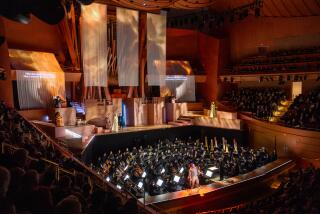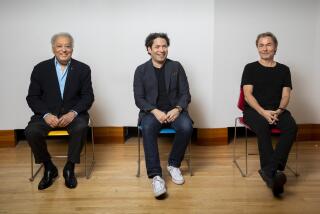A new high for countertenors
- Share via
It’s hard being a countertenor: Aside from having to sing a spate of high notes generally voiced by altos, you must seduce listeners shocked by males trolling in high registers. But as more countertenors appear on contemporary stages, the clearer it becomes that the best boast a vocal muscularity which, combined with conquering the sonic stratosphere, produces some of our most arresting male voices.
Of this lot, German countertenor Andreas Scholl represents the gold standard, and on Tuesday night at Disney Hall, in a Baroque chamber-music program performed by Los Angeles Philharmonic musicians, he was the main event. Wearing a Milan-style business suit and a sly smile on his youthful face, Scholl appeared after an adequate performance of Bach’s B-minor Flute Sonata and sang three Handel arias and a Vivaldi cantata before Philharmonic players finished with a routine rendition of Bach’s Second Orchestral Suite.
In town also for this week’s Philharmonic performances of Handel’s pop-Baroque “Messiah,” Scholl, who composes pop and studied with Baroque master Rene Jacobs, programmed more obscure Handel tunes, and the results were appetizing.
In “Cara sposa” from “Rinaldo,” the composer’s first Italian opera composed for the London stage, he summoned tender, youthful evocations of affection, beginning the word “cara” (beloved) soft, still and thin before holding it long, increasing its dynamic and thickness, and eventually letting go. Expressive and masculine at once, he appeared to plead with an imaginary judge as he sang, extending his hands out from his chest. Which is why his abrupt mood change on a line about defying evil provided intense contrast. Here, Scholl’s golden voice grew agitated and volatile. His message was lucid: Countertenors aren’t wimps.
The remaining Handel works -- “Se parla nel mio cor” from “Giustino” and “Ombra mai fu” from “Xerxes” -- were more traditional. The first, ornamented with celebratory melismas, came off jubilant, “Messiah”-esque. The second was high drama, broadly sewn together with dissonant suspensions and angelic enunciations of multisyllabic words like “vegetabile” that in Scholl’s voice seemed as clean and organic as California produce.
Vivaldi’s cantata “Cessate, omai cessate” -- a plea to “cruel memories of a tyrannical love” -- gave Scholl more opportunity to share his gift for nuanced tone-painting. In the first, gentle aria, featuring light string staccatos and plucks, he shocked the crowd by lowering his sweet voice into rancid-milk twangs on words like “ingrata” (“woe”) and, even more starkly, “morte” (“death”). In the aggressive second and last aria, he channeled a vengeful depressive, letting his vibrato free to oscillate wildly as violin tremolos increased the music’s tension.
During this work and others, it was easy to observe numerous audience members shudder, shake and swoon. That they had had to endure some workaday chamber music was a more than fair admission price for such memorable fireworks.
More to Read
The biggest entertainment stories
Get our big stories about Hollywood, film, television, music, arts, culture and more right in your inbox as soon as they publish.
You may occasionally receive promotional content from the Los Angeles Times.










